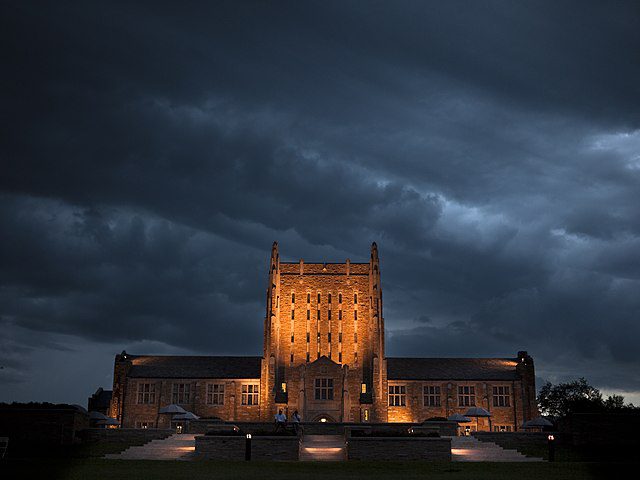How a University Dies, the New Helvetica, and Abandoning Quantum Mechanics

The University of Tulsa has been losing millions of dollars a year for years. Its new president, a psychiatrist, cares more about how its students feel than what they learn. Now, it has restructured the university to focus on professional skills and social justice. Jacob Howland recounts the grim—and, at times, farcical—story of the university’s decline.
America resembles Le Corbusier’s dream country in Radiant City, and it’s a nightmare,says Lee Hardy: “In a later work, The Radiant City (1935), the lead author of the Charter of Athens, Swiss architect Le Corbusier, envisioned his urban ideal: ‘The cities will be part of the country. I shall live 30 miles from my office in one direction, under a pine tree; my secretary will live 30 miles away from it too, in the other direction, under another pine tree. We shall both have our own car. We shall use up tires, wear out road surfaces and gears, consume oil and gasoline. All of which will necessitate a great deal of work . . . enough for all.’ Corbusier’s dream of full employment based on dispersed, auto-dependent development has become in large part a reality in North America—and the nightmare of later generations who find themselves bound to a car and stuck in traffic.”
Breaking: Helvetica gets a facelift. “The new version, Helvetica Now, updates each of Helvetica’s 40,000 characters to reflect the demands of the 21st century. It’s designed to be more legible in miniature, like on the tiny screen of an Apple Watch, and hold its own in large-scale applications like gigantic billboards. Nix, who has spent two years reengineering the letters, hopes it will let designers see Helvetica in an entirely new way.”
In January, it was announced that Michel Houellebecq would receive a Legion of Honor prize. He was decorated chevalier yesterday by French president Emmanuel Macron.
A school in Barcelona has removed a third of its library books for being sexist: “These included several versions of the stories about Little Red Riding Hood and Saint George, a popular read at Catalonia’s celebration of the Diada de Sant Jordi on 23 April.”
For ten years, Terry Gilliam tried and failed to make a movie based on Miguel Cervantes’s Don Quixote. “A stricken star (the now-late Jean Rochefort), horrible weather in meticulously handpicked location settings, insurance woes, and a loss of confidence by backers resulted in a premature shuttering of the production” in 2002. Last year, however, with a different script and a new cast, he finally completed it. He shouldn’t have, argues Anthony Sacramone: “While I admire Gilliam’s—let’s get the word out of the way—quixotic career, crafting original, provocative, and visually stunning works often under all kinds of studio and financial pressures, his Quixote is a glorious mess, emphasis on mess, that should have remained a never-realized ideal, like Kubrick’s epic Napoleon.”
Essay of the Day:
In The New Atlantis, David Guaspari explains why physicists abandon quantum mechanics and why they shouldn’t:
“In What Is Real? the physicist and science writer Adam Becker offers a history of what his subtitle calls ‘the unfinished quest for the meaning of quantum physics.’ Although it is certainly unfinished, it is, as quests go, a few knights short of a Round Table. After the generation of pioneers, foundational work in quantum mechanics became stigmatized as a fringe pursuit, a career killer. So Becker’s well-written book is part science, part sociology (a study of the extrascientific forces that helped solidify the orthodoxy), and part drama (a story of the ideas and often vivid personalities of some dissenters and the shabby treatment they have often received).
“The publisher’s blurb breathlessly promises ‘the untold story of the heretical thinkers who dared to question the nature of our quantum universe’ and a ‘gripping story of this battle of ideas and the courageous scientists who dared to stand up for truth.’ But What Is Real? doesn’t live down to that lurid black-and-white logline. It does make a heartfelt and persuasive case that serious problems with the foundations of quantum mechanics have been persistently, even disgracefully, swept under the carpet.
“Why does that matter? Because, as John Stewart Bell, one of the book’s heroes, believed, the attempt to provide understanding is a moral matter. Dismissing philosophical criticism is not only philistine, it’s bad science. Physics isn’t finished. A theory is not only a way to address the problems at hand; it’s a jumping off point for the next, better, theory. And quantum mechanics is the theory that any new idea in fundamental physics must accommodate.”
Photos: Wisteria tunnels
Receive Prufrock in your inbox every weekday morning. Subscribe here.
Comments